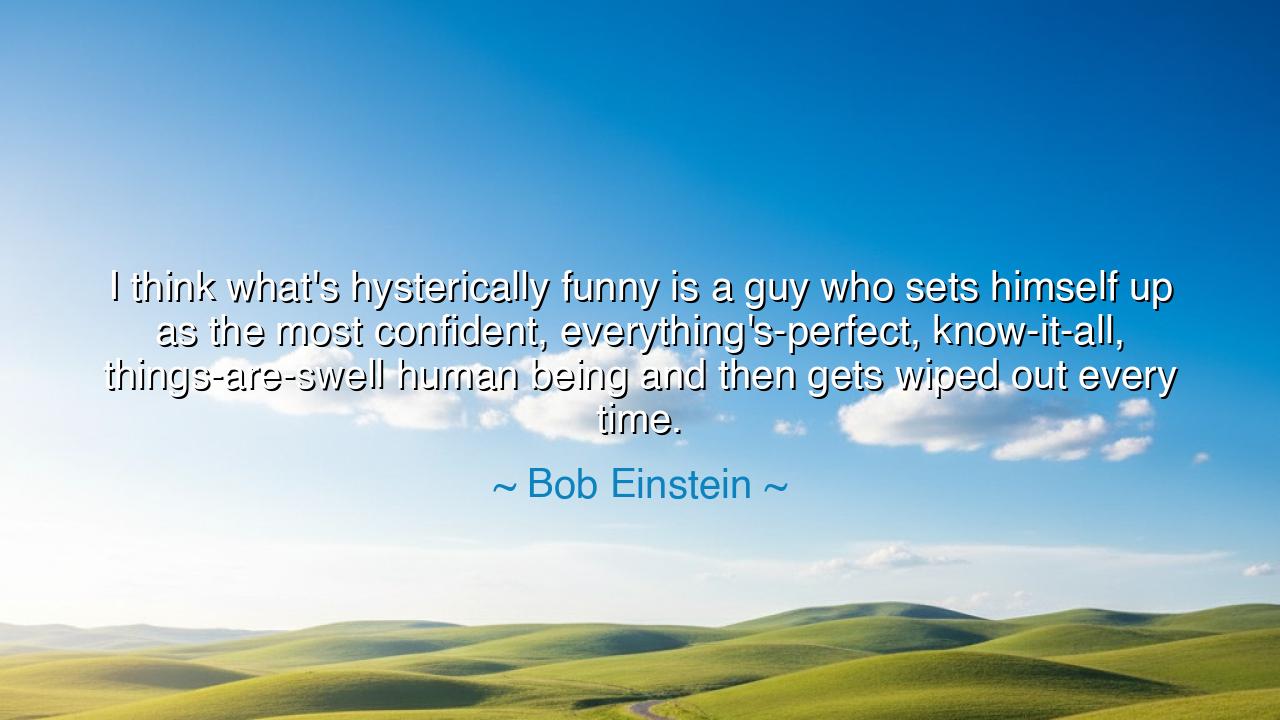
I think what's hysterically funny is a guy who sets himself up as
I think what's hysterically funny is a guy who sets himself up as the most confident, everything's-perfect, know-it-all, things-are-swell human being and then gets wiped out every time.






In the words of Bob Einstein, “I think what's hysterically funny is a guy who sets himself up as the most confident, everything's-perfect, know-it-all, things-are-swell human being and then gets wiped out every time.” Beneath the laughter, these words reveal a profound truth about the nature of hubris, humility, and the eternal humor of human folly. Einstein, known for his brilliant comedic mind, speaks here as more than a comedian — he speaks as a philosopher of irony. His insight reminds us that the spectacle of pride meeting its downfall is not just amusing; it is universal, an echo of ancient stories, a mirror reflecting the fragile vanity of the human heart.
Since the dawn of storytelling, the fall of the arrogant has been one of humanity’s oldest themes. The Greeks called it hubris — the pride that blinds a man to his limits, the illusion of perfection that summons his undoing. In every tragedy, from Oedipus to Icarus, the hero who soars too high is inevitably brought low, not by cruelty of fate, but by his own presumption. Bob Einstein, in his modern jest, simply dresses this ancient wisdom in laughter. The man who believes himself untouchable — the “know-it-all,” the “everything’s-perfect” soul — becomes the fool, undone not by external forces but by his own self-deception. Comedy, then, becomes a mirror of life’s moral law: the higher we build our image, the funnier and more painful it is when it collapses.
To laugh at such a downfall is not cruelty; it is recognition. We see in the “wiped-out” man a reflection of ourselves — our own pretensions, our own moments of false confidence. Laughter, in this sense, becomes a form of wisdom. It humbles without hatred, teaching us through joy what tragedy teaches through tears. When Einstein says it is “hysterically funny,” he is acknowledging this cosmic rhythm — that the comedy of failure is one of nature’s gentlest teachers. It exposes truth through absurdity and frees us from the weight of taking ourselves too seriously.
Consider the ancient tale of King Croesus of Lydia. Wealthy beyond measure, he believed himself favored by the gods, certain that fortune would always smile upon him. Yet when he went to war, trusting his destiny, he was defeated and captured. Looking into the flames of his own downfall, he remembered the philosopher Solon, who once told him, “Count no man happy until he is dead.” Croesus laughed bitterly at his own pride — and in that moment of recognition, wisdom was born. So too, in Einstein’s comedic vision, the proud man who is “wiped out every time” finds not just humiliation, but a kind of redemption. The fall is the cleansing; the laughter is the light that follows.
Einstein’s humor carries this wisdom in disguise. His characters — often pompous, overconfident, and absurdly self-assured — remind us of the beauty of imperfection. They stumble, crash, and fail spectacularly, yet in their failure, we find something deeply human. It is through their misfortune that we, the audience, learn to forgive ourselves for our own. Comedy becomes a sanctuary, a sacred place where we may laugh at what would otherwise break us. In the fool’s defeat, we find freedom — the freedom to be flawed, to err, to fall and rise again without shame.
And there is power in this. For to laugh at arrogance is also to affirm humility as strength. Einstein’s wisdom teaches us that the self-aware man — the one who knows he is fallible — can never be fully destroyed. It is only the man who believes himself invincible who meets ruin. Thus, laughter becomes not mere amusement but enlightenment — a soft light revealing the cracks in human pride. It is a mercy that we laugh, for laughter teaches without punishment, humbles without breaking, heals without bitterness.
So let this be the lesson: learn to laugh at yourself before life does it for you. Do not fear the fall, for it is the fall that awakens humility, and humility is the root of wisdom. When you stumble, smile; when you err, see the comedy in it. For the universe, like a patient teacher, will always show us our limits — sometimes through pain, but more often through humor.
Practical teaching: Each day, seek to find laughter in your own imperfections. When you boast, remember the fool who “gets wiped out every time,” and let that image soften your pride. When you fail, do not despair; see the cosmic joke in your humanity. Practice humility not as sorrow, but as play. Laugh often — at yourself, at the absurdity of the world, at the grand theater of life. For as Bob Einstein reminds us, the truest laughter is not mockery, but recognition — the joyous awareness that in our folly, we are all wonderfully, beautifully human.






AAdministratorAdministrator
Welcome, honored guests. Please leave a comment, we will respond soon